The CELPIP Test
CELPIP: Canadian English Language Proficiency Index Program
CELPIP is a computerized language proficiency assessment that is ideal for proving English competency for immigration to Canada or for Canadian citizenship. It's administered by Paragon Testing Enterprises, a subsidiary of the University of British Columbia, one of Canada's top universities.
CELPIP is well-known and accepted by many professional institutions, universities, and colleges for those who need an English language certification. The test's four components (reading, writing, speaking, and listening) evaluates a test taker's ability to use everyday English and comprehension to be able to navigate comfortably within Canada.
There are two types of CELPIP tests: CELPIP-General offers an accurate measurement of English proficiency in day-to-day situations, and CELPIP-General LS provides listening and speaking proficiency.
CELPIP - General
- Evaluates Reading, Writing, Listening, Speaking
- Used to apply for permanent citizenship status
CELPIP - General LS
- Evaluates Listening, Speaking
- Needed to apply for citizenship status


Advantages of the CELPIP Exam
- Easy to prepare for the test: CELPIP is designed by a local Canadian institution, and the test sites are based on daily work and study in Canada. If candidates have life experience in Canada, preparation for the exam will be much easier.
- Simple question types: The CELPIP test is a computer-based test. Listening and reading are only multiple-choice questions, which is easier to master. Save time spell checking and writing by hand, making your time more focused on improving your score.
- Easy to apply: The minimum interval between bookings of the CELPIP exam is at least 4 days. Exam results are provided within 1 week. As there are many exam centres, candidates can continuously register for the exam without needing to wait too long.
- Help immigrants: The scoring system of the CELPIP exam is based on the official scoring standard of the Canadian Immigration Bureau, the CLB scoring standard. Candidates who need immigration English scores can easily use CELPIP to meet the requirements of Immigration Canada.

Enjoy professional online courses at home!
Professional online technical support · Get face-to-face communication opportunities with CELPIP officials · Experienced CELPIP and English training by local teachers · Quickly improve and see results immediately!
CELPIP vs IELTS
- The two exam types are CELPIP General and General-LS.
- General has all four sections (listening, speaking, reading, and writing).
- General-LS is only focused on listening and speaking.
- Questions are oriented towards daily life and are solely multiple-choice.
- The entire exam is computer-based and can be done in one sitting.
- The two types are Academic and General.
- Academic is designed for students who need it to apply for a post-secondary institution.
- General is for immigrants and is divided into two parts: written and oral.
- The content is also divided into daily life and academic.
- Some regions offer a computer-based IELTS exam, but it is often a written one.

CELPIP Test Format
Learn about how the CELPIP exam is formatted, what the CELPIP scores mean, and how to calculate your CELPIP score.
How CELPIP Grading Works
CELPIP test scores have been calibrated against the Canadian Language Benchmark (CLB) levels to better understand your English proficiency against Canadian standards. Below, you will see the criteria used to evaluate your English understanding based on each CELPIP level.
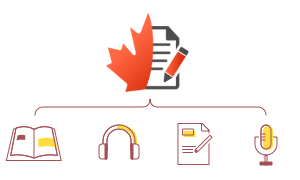
The 4 Components of CELPIP
The exam is three hours long and can be done in one sitting.
Listening
A great difference between CELPIP and IELTS' listening section is that CELPIP only uses Canadian colloquialism and accents. IELTS uses multiple accents that can be difficult for test takers, especially if they struggle with English comprehension themselves.
Each question is timed and the timer is visible in the top-right corner of the screen. This will give test takers a visual representation of how they should pace themselves, and they have the option to click to the next question or let the computer do so automatically after time has run out. All questions are multiple-choice, so it's important to read the questions carefully to select the best answer.
Listening topics are the same, no matter the exam. They include listening to problem solving, daily life conversations, information, an oral news item, a video about a conversation, and viewpoints. The content is often related to Canadian cultures or traditions.

- Parts
- 6
- Questions
- 38
- Time
- 55 mins.
- Question Type
- Multiple choice
Reading
IELTS have different subject matters that vary from exam to exam. This can range from daily life encounters to historical accounts. On the other hand, CELPIP has a fixed structure, and its content is related to Canadian cultures and traditions.
The first part requires test takers to read correspondence and answer multiple-choice questions. The second is a diagram, which can also be a flyer, menu, website, or advertisement that can be found in the community, and test takers will need to fill in the blanks to a prewritten passage. The third section is the most difficult as it requires reading for information, and the last section focuses on opposing viewpoints.
Again, all questions are multiple-choice. Each question is timed and test takers will be able to see the time allocation on the top right-hand corner of their screen. It is important not to rush but to pay equal amounts of attention to each question.

- Parts
- 4
- Questions
- 38
- Time
- 60 mins.
- Question Type
- Multiple choice
Writing
The writing compositions in IELTS have two different word requirements. One needs 150 words and the other needs 200 words. Since the entire exam is handwritten, test takers may find this task difficult to accomplish within the time limit. CELPIP, on the other hand, has the same word limit of 150 - 200 words for both of its writing sections, and test takers will be able to type them out.
The advantage of being able to type these responses is that a word counter will track your response as you type. There is also spell-check, which will alert you of any errors. The formatting is standardized and you are only responsible for using the correct structure and fulfilling the necessary criteria.
Although the word requirement is lower for CELPIP, it is important to be specific and use your words wisely. The sections are also timed, so if you finish early, review your work and ensure it’s the best quality that you can create!

- Parts
- 2
- Questions
- 2
- Time
- 55 mins.
- Question Type
- Written answer
Speaking
The speaking section is the most difficult task in both IELTS and CELPIP. Another great difference between the two tests is that IELTS requires a separate face-to-face appointment with an examiner that takes about 15 minutes. CELPIP’s speaking section is done within the same sitting and is recorded by a microphone.
Many may find the IELTS speaking section more natural because you’re having an actual conversation with another person. However, it can also be stressful because the examiner will observe more than just your response, like your body language, intonation, and accent. You will also not know what the questions will be beforehand.
The CELPIP speaking section is predictable and can be practiced. You may feel uncomfortable talking to yourself, but an examiner will not hear your responses until after your test is completed. It takes about 20 minutes to complete, but you will have time in between responses to think about the question and formulate your response.

- Parts
- 8
- Questions
- 8
- Time
- 20 mins.
- Question Type
- Spoken answer
Grading Criteria
Level 12
Listening
- Can understand conversations relating to day-to-day activities and recognize indicators of the speakers’ attitudes.
- Understands informal conversations about unfamiliar topics.
- Can understand audio presentations on various topics.
- Can understand the topic and much factual information in more formal presentations of complex topics such as social issues, business, or politics.
- Can discern differences of opinion expressed in such presentations and many aspects of the argumentation that support the opinions.
Reading
- Knows different types of texts and how to identify them.
- Able to find the main points and factual information swiftly.
- Capable of identifying complex styles of grammar, sentence structures, and context within a text and knows how they present the information.
- Able to identify ideas and opinions for all topics.
- Can make inferences, analyze the text, and provide evidence.
- Can determine the author’s position in a text.
Writing
- Able to use sophisticated sentence and paragraph structures.
- Can use advanced vocabulary to describe your thoughts and impressions.
- Uses a wide range of vocabulary in their proper forms.
- The response given is realistic, believable, and logical.
- Can effectively and formally express ideas, suggestions, and criticisms in a constructive and appropriate manner.
- Can organize information in a logical and consistent manner.
Speaking
- Able to construct sentences with moderately complex syntax.
- Able to express a broad range of feelings and preferences and also express attitudes towards a broad range of objects and circumstances.
- Can provide advice, use persuasion, and support points with sophisticated reasons.
- Able to provide precise descriptions of situations and contexts. Able to clearly inform others about unfamiliar or unusual situations or experiences.
Level 11
Listening
- Can understand conversations about day-to-day activities and recognize indicators of the speakers’ attitudes.
- Can understand unfamiliar topics in conversation and in different audio presentations.
- Can understand the topic and factual information in more formal presentations of complex topics. You are also able to discern differences of opinion expressed in such presentations and many aspects of the argumentation that support the opinions.
Reading
- Knows different types of texts and their purposes to be able to identify them.
- Can find the main points. factual information, and identify ideas and opinions swiftly.
- Capable of identifying complex styles of grammar, sentence structures, and context and knows how they present the information.
- Can make inferences, analyze the text, and provide evidence.
- Can determine the author’s position in text depending on the language or structure.
- Familiar with topics like social issues, business, or politics to inform your understanding.
Writing
- Able to use sophisticated sentence and paragraph structures, and advanced vocabulary to accurately describe your
- thoughts.
- Able to provide an appropriate, detailed, and valid response in writing.
- Can effectively and formally express ideas, suggestions, and criticisms in a constructive and appropriate manner.
- Can organize information in a logical and consistent manner.
- Familiar with many writing formats, including unconventional ones.
Speaking
- Able to construct sentences with moderately complex syntax. pr figurative language.
- Usually able to express a broad and precise range of feelings and preferences and also express your attitudes towards a broad range of objects and circumstances.
- Familiar with social conventions to effectively adjust the social circumstances.
- Able to provide advice and use persuasion. Can support your point of view with reasons that are often sophisticated or subtle.
- Able to provide clear, precise and often sophisticated descriptions of familiar situations and contexts. Able to clearly inform others about unfamiliar or unusual situations or experiences.
- Able to provide detailed, precise, and often complex or sophisticated narratives about personal experiences
Level 10
Listening
- Familiar with different daily conversational topics.
- Can apply personal experiences with daily life activities.
- Familiar with different audio formats like radio shows, podcasts, news reports, etc.
- Can recall keywords and phrases, as well as additional features like mood, tone, word choice, or viewpoints.
- Can effectively summarize audio presentations and identify different perspectives based on the language used.
Reading
- Can identify different types of text and their purposes.
- Able to find the main points and factual information.
- Familiar with advanced styles of grammar, sentence structures, and context to understand the information.
- Can easily locate information in a graphic or diagram.
- Able to identify ideas and opinions no matter the topic.
- Can make inferences depending on the text and provide evidence to back them up.
- Can determine the author’s position in text depending on the language or structure.
- Able to provide your own commentary on topics like social issues, business, or politics.
Writing
- Able to use complex sentence and paragraph structures.
- Can use difficult vocabulary that describes your thoughts and impressions depending on the situation and their correct forms.
- Uses more varied and advanced vocabulary.
- Able to provide an appropriate, detailed, and valid response in writing.
- Can effectively express your ideas, suggestions, and criticisms in a constructive and appropriate manner.
- Can organize information in a logical and consistent manner.
- Familiar with many writing formats.
Speaking
- Can use a variety of sentence patterns and grammar to articulate a response.
- Can use advanced and new vocabulary and terminology to express ideas and meanings.
- Able to express thoughts, opinions, and viewpoints with clarity.
- Familiar with social practices and can initiate them without hesitation.
- Able to give advice and persuade others that is realistic and difficult to contest.
- Can give accurate descriptions no matter the situation or context.
- Can provide a structured personal narrative with a beginning, middle, and end.
Level 9
Listening
- Is familiar with common daily conversational topics.
- Able to apply personal experiences with daily life activities mentioned in conversation.
- Can identify problems and solutions that may arise in conversation.
- Understands non-professional audio like social media posts or recordings.
- Can retain more than keywords and phrases that may help answer some questions, like context, feelings, or moods.
- Able to summarize dialogue or speeches in one long sentence.
- Can identify different perspectives based on feeling.
Reading
- Can identify different types of text and their purposes after brief consideration.
- Able to find the main points and factual information, no matter the topic.
- Familiar with varying types of grammar, sentence structures, and context to help you understand the information.
- Can locate information within a graphic or diagram with ease.
- Able to identify ideas and opinions on topics that you are not familiar with.
- Can make inferences depending on the text and provide evidence.
- Can grasp the author’s position in text depending on the vocabulary.
- Has a basic background to help understand social issues, business, or politics.
Writing
- Able to use complex sentence and paragraph structures.
- Can use difficult vocabulary appropriate for the situation and their correct forms.
- Uses more advanced vocabulary to express your opinions or thoughts.
- Able to provide an appropriate, detailed, and valid response in writing.
- Can effectively express your attitudes, suggestions, and criticisms in a constructive and appropriate manner.
- Can organize information in a logical and consistent manner.
- Familiar with many writing formats, including unconventional ones.
Speaking
- Can organize and vary sentence patterns and grammar.
- Can use slightly advanced vocabulary and correct terminology to express ideas and meanings.
- Able to express thoughts and opinions with accurate vocabulary.
- Familiar with social practices and can follow social cues when appropriate.
- Able to give advice and persuade others with complicated reasoning.
- Can provide concise descriptions of familiar situations and contexts.
- May also be able to describe unfamiliar situations with clarity.
- Can provide a structured personal narrative.
Level 8
Listening
- Is familiar with common daily conversational topics.
- Able to apply personal experiences with daily life activities mentioned in conversation.
- Can identify problems and solutions that may arise in conversation.
- Understands non-professional audio like social media posts or recordings.
- Can retain more than keywords and phrases that may help answer some questions, like context, feelings, or moods.
- Able to summarize dialogue or speeches in one long sentence.
- Can identify different perspectives based on feeling.
Reading
- Can identify different types of text and their purposes after brief consideration.
- Able to find the main points and factual information, no matter the topic.
- Familiar with varying types of grammar, sentence structures, and context to help you understand the information.
- Can locate information within a graphic or diagram with ease.
- Able to identify ideas and opinions on topics that you are not familiar with.
- Can make inferences depending on the text and provide evidence.
- Can grasp the author’s position in text depending on the vocabulary.
- Has a basic background to help understand social issues, business, or politics.
Writing
- Able to use complex sentence and paragraph structures.
- Can use slightly more difficult vocabulary and their correct forms.
- Uses appropriate or more advanced vocabulary depending on the situation.
- Able to provide an effective and detailed response in writing.
- Can organize information that follows a progression or consistent manner.
- Familiar with most writing formats.
Speaking
- Can organize and vary sentence patterns and grammar.
- Can use slightly advanced vocabulary and correct terminology to express ideas and meanings.
- Able to express thoughts and opinions with accurate vocabulary.
- Familiar with social practices and can follow social cues when appropriate.
- Able to give advice and persuade others with complicated reasoning.
- Can provide concise descriptions of familiar situations and contexts.
- May also be able to describe unfamiliar situations with clarity.
- Can provide a structured personal narrative.
Level 7
Listening
- Can understand common daily conversational topics.
- Able to apply the daily life activities into your own life.
- Can identify problems and solutions that may arise in conversation.
- Understands non-professional audio like social media posts or recordings.
- Can retain keywords and phrases that may help answer some questions.
- Able to summarize dialogue or speeches in one or more sentences.
- Can identify different perspectives by guessing.
Reading
- Can identify different types of text and their purposes after careful consideration.
- Able to find the main points and factual information, especially for everyday topics.
- Familiar with simple grammar, sentence structures, and context to help you understand the information.
- Can locate information within a graphic or diagram.
- Able to identify where ideas may be within a written structure even if the subject is one that you are not familiar with.
- Can make inferences depending on the text.
- Can grasp the author’s position in text depending on the vocabulary.
- Can understand social issues, business, or politics without needing too much background information.
Writing
- Able to write responses following a basic paragraph structure.
- Can use proper basic vocabulary and their correct forms.
- Uses the appropriate vocabulary depending on the situation.
- Able to provide a suitable response in writing.
- Can organize information in a clear and logical format.
- Familiar with most writing formats.
Speaking
- Can organize and vary sentence patterns.
- Can use basic and common vocabulary and occasionally accurate terminology to express ideas and meanings.
- Able to express thoughts and opinions with basic vocabulary.
- Familiar with social practices and can pick up social cues when possible.
- Able to give advice and persuade others with slightly complicated reasoning.
- Can provide concise descriptions of familiar situations and contexts.
- May also be able to describe unfamiliar situations.
- Can provide a personal narrative.
Before, During, and After the Exam
Before the Exam
- Prepare all the necessary documents that you will need. This includes valid, unexpired photo identification used to register for the exam (we recommend using your passport), and a copy of your test confirmation email. Store these in a folder for easy access.
- Arrive at the testing centre 45 minutes early so that you can be checked in. Use the washroom beforehand because you will not be able to leave the testing site unescorted. Do not bring valuables with you because only your ID is allowed.
- Ensure that you had a sufficient amount of sleep the night before and an energizing meal beforehand. This will give your brain the energy needed to function properly and help you stay alert!
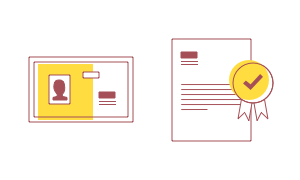
During the Exam
- When you have entered the testing room, you will be brought to a computer and given some paper and a pen. You can use these papers to take notes, write drafts, or create outlines for any of the questions. You may request for more if needed.
- You will not be the only test taker in the room! This means you will hear other people typing or speaking. You can use your provided headset as a way to muffle the sounds.
- The time limit is three hours. You may need more or less of the allotted time depending on your reading and answering speed. Be sure to pace yourself accordingly and give yourself more time on sections that you may have trouble with. The key is not to be the first one to finish; the objective is to have a completed exam that you are confident about.
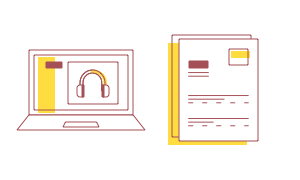
After the Exam
- Once you’ve finished the exam, you will need to return your pen and paper to the test invigilators.
- Take some time after leaving the test center reflecting on how you perceive your own performance. Was there anything you wished you could've done differently? Was there a section that was your weakest? Which questions did you struggle with? Was it because of the wording or because you didn't understand it?
- Celebrate! Relax and unwind with a nice meal. Congratulations - you finished a physically and mentally challenging exam. Your results will be available on CELPIP's website 4 to 5 calendar days after you have taken the exam.
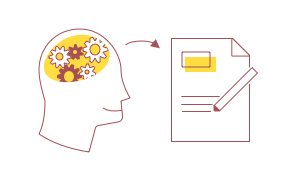
Exam Preparation Guide
Time is of the essence.
Each question has a time limit. This is to ensure that the test taker will be able to complete the exam within the allotted time. If you don't answer the question before time is up, the exam will automatically move to the next one. This is not meant to put pressure on you, but rather to remind you that there is more to the exam than the question you're working on.
You'll need to be careful when it comes to the speaking section. Each question gives you 30 seconds to prepare before the recording begins automatically. If there is any delay between the start of the recording, marks will be deducted. It is important to have every question answered, regardless of if it's correct or not. It is better to guess than to leave a question blank.
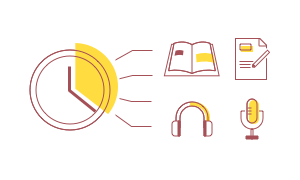
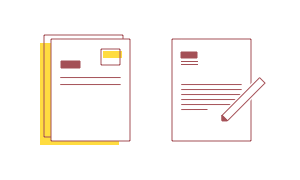
Use your pen and paper.
You will only hear each question and audio segment once in the listening section, and remembering everything will be difficult, even for a seasoned English speaker! Use your paper to take notes like keywords or phrases, or your own impressions of the audio so that you won't forget the main points. You may also use it to create outlines or jot notes down for the writing section to remind you on what you have to write in your response.
If you're unsure how to effectively take notes, simply ask yourself: what is the main idea? What is happening? Summarize the section in one sentence or less, and then break it down further into smaller components.
Quality, not quantity.
Although the writing section is much simpler for CELPIP than IELTS, the scoring requirements are incomparable. Each writing section has a word limit of 150 - 200 words, and it is recommended that test takers do not go over 5% of the minimum or maximum. It is imperative to follow the written structure appropriate for the question and follow the criteria provided.
Do not aim to use all 200 words. Focus your attention on being concise, expressing yourself with the fewest words possible, and be specific. If you are struggling with this, be sure to outline everything on paper before you start writing.
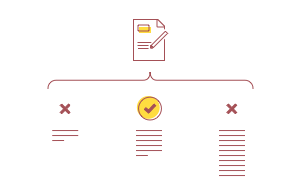
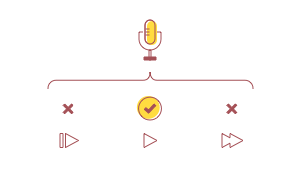
Speak like a normal conversation.
It is common for test takers to hear other candidates during their responses for the speaking section. To ensure that the evaluators can hear you, be sure to speak in a clear, measured voice - meaning not too slow or too fast. Your response will be delivered through a headset with an attached microphone, so make sure to test it for clarity before you begin recording your responses.
CELPIP is not the same as IELTS.
Many believe that IELTS and CELPIP are similar and they can use their IELTS knowledge to apply to the CELPIP exam. This is not true! Both have different testing structures - IELTS is divided into written and oral tests, whereas CELPIP is exclusively computer-based. The content that both exams use are varied and the criteria for each answer is also different. In order to succeed in the CELPIP exam, you will need CELPIP-specific skills. Think of it as driving a car - playing a simulated game is not the same as driving in real life!


CELPIP Test Dates
Ready for the exam? Learn how to register today!
Step-by-Step Guide to CELPIP Registration
Want to register for the CELPIP exam, but don’t know where to start?
We provide an overview of how to register below!
Get exam preparation, exclusive practice, and guaranteed high scores!
If CELPIP is the right choice for you, get ahead quickly with our effective courses.

CELPIP Elite Class
CLB 7+
Suitable for students who want a CELPIP score above 7 and develop a more advanced understanding.
View Class

CELPIP Sprint Class
CLB 4-7
Get CELPIP review on the test format and learn unique strategies to boost your scores.
View Class

Adult English
CLB 3-4
Learn foundational English at your own pace in a judgement-free environment!
View Class

Casual English
CLB 0-3
Learn basic spelling, listening, and speaking skills to aid them in daily life. No CELPIP experience needed.
View Class

1v1 Class
All
Get extra help or focus on specific areas and issues from our professional CELPIP tutors.
View Class
More Test Resources for You
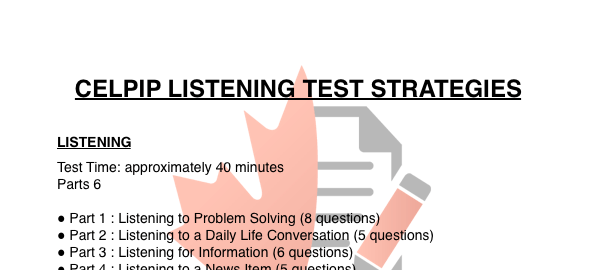
We provide exclusive in-house CELPIP sample tests for students and workshops with official partners. The official CELPIP website provides paid materials and workshops but does not offer 1-on-1 teaching. Materials are often in English, which can be stressful for beginner students. CELPIP Test Prep provides Chinese resources for stress-free learning.
Check out our YouTube channel for more tips and tricks to help you with CELPIP!
Listening Skills
Speaking Skills
Writing Skills
Frequently Asked Questions about CELPIP
Compared with IELTS, CELPIP has the following advantages:
The CELPIP exam is new, and the difficulty of the exam is relatively low. All the questions are multiple-choice, which eliminates the loss of scores caused by misspellings in the IELTS test. Moreover, a single question type makes the difficulty of the examination questions lower. CELPIP’s listening portion uses Canadian accents, rather than international accents such as in the IELTS test, which helps reduce test takers’ stress. The word count of the writing questions written for CELPIP is 150 words each, which is equivalent to two essays for IELTS. CELPIP test takers can also utilize the word counter and spelling error check while writing. Finally, CELPIP’s oral questions are fixed. After the candidates have mastered the rules and skills of the question types, they are more familiar with the recording of the computer-based test. Learn more about the differences here.
- You need to be present 45 minutes in advance on the test day;
- Mobile phones, watches, and electronic products cannot be brought into the examination room;
- After checking your ID, a photo will be taken, which will be displayed on your computer for the exam;
- After your photo is taken, you will get your seat number and login code code to access the testing computer. Remember to check the microphone and headset first to ensure that the equipment is working properly.
Your exam results will be available online through your CELPIP account in 4 - 5 calendar days after the test date. You can download your report as a PDF and view your scores on your account up to 2 years after your test date.
CELPIP Test Prep is officially recognized by Paragon to be a certified CELPIP learning center. Our teachers are CELPIP certified and our curriculum is constructed using their expertise to help students achieve their own desired scores.
Yes, candidates can cancel or reschedule their exams through their CELPIP account. If you’d like to cancel, you can get a 50% refund of the registration fee if you cancel 9 days before the test date. If less than 9 days, then there will be no refund. If you want to reschedule, you must pay the rescheduling fee. If you are applying to reschedule wtihin 9 days of the test day, you will need to provide additional proof of application.
CELPIP General assesses reading, writing, listening, and speaking and prepares test takers for permanent residency and applying for work permits. CELPIP LS only assesses listening and speaking, and is needed for citizenship. Preparing for CELPIP General will take more time than CELPIP LS, but the skills learned for the listening and speaking sections are still similar.
CELPIP-Standard costs $280. Additional fees will be charged if the test-taker needs to cancel or reschedule their exam.
Our prices are fixed; however, there are occasional promotions, so please stay in touch with us to learn more about these sales! We also give preferential prices to students who recommend new students, so please spread the word about our services to your friends who may need them!
Frequently Asked Questions about CELPIP Grading
You can apply for a re-evaluation online through your CELPIP account. It is only valid within six months of having taken the exam, and you can re-evaluate all or some components. You must pay a fee depending on which component you want to be re-evulated, and if any level changes, the fee will be refunded. Requests are final sale and cannot be cancelled once submitted. Reading and Listening sections cannot be re-evaluated because they are computer rated.
If you would like to retake the exam, you may register for no more than one test session within 4 calendar days. It is recommended that you take the time to study materials before doing so.
- You need to be present 45 minutes in advance on the test day;
- Mobile phones, watches, and electronic products cannot be brought into the examination room;
- After checking your ID, a photo will be taken, which will be displayed on your computer for the exam;
- After your photo is taken, you will get your seat number and login code code to access the testing computer. Remember to check the microphone and headset first to ensure that the equipment is working properly.
CELPIP Test Prep is officially recognized by Paragon to be a certified CELPIP learning center. Our teachers are CELPIP certified and our curriculum is constructed using their expertise to help students achieve their own desired scores.
Each component of CELPIP General and CELPIP LS is given a CELPIP level. Since CELPIP scores have been calibrated against the Canadian Language Benchmark (CLB) levels, they are equivalent to one another and do not need additional conversion.
You can access your scores online for 2 years from the test date. However, the length of time that your scores are considered valid by various institutions is determined by their policies.
Please take a look at our grading section for further clarification on what test-takers’ competency skills include.
Our prices are fixed; however, there are occasional promotions, so please stay in touch with us to learn more about these sales! We also give preferential prices to students who recommend new students, so please spread the word about our services to your friends who may need them!
Frequently Asked Questions about CELPIP Exam Registration
It is not mandatory for you to input a cellular phone number; it is simply easier for you to receive updates in case the test you signed up for was canceled or changed. If possible, use a relative and friend’s phone number to help you.
You do not need to submit a photo of yourself. You will need to have your photo taken on the day of the exam before the exam begins.
If you need to update your details, you must send an email to the CELPIP office to submit a formal request. The name and date of birth entered for your test reigstration must match with the ID presented on the exam date.
Although it is computerized, it must be completed in person at a CELPIP testing centre.
Yes, candidates can cancel or reschedule their exams through their CELPIP account. If you’d like to cancel, you can get a 50% refund of the registration fee if you cancel 9 days before the test date. If less than 9 days, then there will be no refund. If you want to reschedule, you must pay the rescheduling fee. If you are applying to reschedule wtihin 9 days of the test day, you will need to provide additional proof of application.
You cannot register for an exam physically at a testing centre. Registration is only allowed online on CELPIP’s official website.
CELPIP payments accepted include VISA, MasterCard, American Express, and PayPal. If you don’t have a credit card, you can use prepaid credit cards to pay online.
The exam costs $280. To pay, you will need to add the exam to your cart and then checked out. Please refer to our guide above for screenshots to guide you.
Testimonials
I have improved my CELPIP writing and speaking a lot by participating in the sprint class of CELPIP. The skills and sentence patterns guided by the teacher are very helpful! Thank you for your professional guidance!
 Sherry CELPIP Test Prep Student
Sherry CELPIP Test Prep Student
After 4 weeks, I established solid test skills in listening, speaking, reading, and writing, and I am confident in the CELPIP exam. It is highly recommended to friends who must prepare for the exam within a limited time. Thank you for your professional CELPIP exam preparation.
 Nicky CELPIP Test Prep Student
Nicky CELPIP Test Prep Student
Teacher Alan is really a good teacher! After taking a few classes of his, I have mastered the solid CELPIP exam skills, which makes me full of confidence in this exam. Thanks again for the professional courses and services.
 Wang CELPIP Test Prep Student
Wang CELPIP Test Prep Student

























 Contact Us
Contact Us

